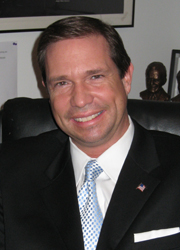May 1, 2009 – To all those lawyers who think that the State Bar does not offer them much, James Boll hears you.
And if he doesn’t hear you now, he expects to do so over the next three years as he serves out terms as president-elect, president, and past-president. In the process, he aims to win you over.
 Boll campaigned on a call for a more open State Bar that better delivers services, improves communication with its membership, and – possibly – even becomes a voluntary association. Emblematic of his pledge for greater inclusiveness was a promise to visit every local bar as State Bar president to break down the distance between lawyers and their leadership in Madison.
Boll campaigned on a call for a more open State Bar that better delivers services, improves communication with its membership, and – possibly – even becomes a voluntary association. Emblematic of his pledge for greater inclusiveness was a promise to visit every local bar as State Bar president to break down the distance between lawyers and their leadership in Madison.
Since winning the election April 24 to become president-elect, Boll says he is focused on turning those ideas into actual change. With a membership of 23,000 lawyers, Boll acknowledges that his goals won’t happen overnight when he takes office on July 1. Also, some issues require a more deliberative approach. For example, Boll pledged a full and “honest debate” over the question of dropping mandatory membership with the State Bar.
“What I mean by an ‘honest debate’ is that I don’t want the facts tilted one way or the other,” Boll said. Even though he is a proponent of a voluntary bar, Boll said members should consider all the ramifications of a voluntary bar, including its potential cost structure. Following a fact-based debate, Boll expects a decision that “reflects the opinion of the majority but is respectful of the minority.” Such an outcome can be presented to the Wisconsin Supreme Court which determines the membership status of the State Bar.
An attractive option
Boll’s drive to convert the State Bar into a voluntary association underscores his confidence that he can make the organization relevant to all Wisconsin lawyers and something to which they want to belong.
During the campaign, Boll attributed “membership disillusionment” to the lack of member control over the benefits that are offered and an inefficient, decentralized benefit committee structure. Singling out one benefit as particularly important, Boll said that he would like to be named the Board of Governors liaison to the insurance committee to improve member utilization of the health insurance benefit. Characteristic of his deliberative style, Boll stresses that he would not “dictate” to the committee comprising members knowledgable and experienced in these issues. Rather, he expects to facilitate discussions that produce new solutions.
At the same time, a fresh perspective should not come from just himself, Boll said. As a candidate, Boll said “fresh ideas and broader membership participation” can be achieved by limiting committee members to a two-year term, after which a committee member would then be asked to move to another committee.
Emphasis beyond Madison
Greater membership participation includes more than just committees, Boll said. Some lawyers do not have the time to serve on a State Bar committee, but they can speak on the State Bar’s behalf once or twice a year at their local bar meetings, he said. That kind of face-to-face contact with members is an effective way to deliver news about the State Bar, but it also provides a meaningful opportunity for members to have their concerns heard, he added.
Although Boll will not be president-elect until July, he is already making good on that promise to visit all the local bars himself. “There are 53 local bars, and I’ve been to seven or 10 of them so far,” Boll said.
Boll said he has been as far north as Superior where he dropped in on law firms to hear their concerns. He said distance between Madison and other parts of the state tends to discourage up-state lawyers from involvement and breeds the idea that the State Bar is only for attorneys in Milwaukee or Dane counties. “I intend to be the president for the whole state,” Boll said.
During the campaign, Boll advocated semi-annual meetings held around the state with all local bar presidents to discuss what they hear from their memberships. He also proposed greater attendance at local bar meetings by State Bar staff, committee members, and Board of Governors’ members.
Travel can be difficult, Boll acknowledged. Indeed, Boll said that his candidacy and the travel it required would never have happened without the partnership of his wife and fellow attorney, Lorna Hemp Boll. However, Boll said that the State Bar needs this kind of intensive contact with members.
Commitment to service
Boll does not come to the president-elect office a stranger to the State Bar. A member since 1992, Boll has served on the Board of Governors and several committees, including Member Relations, Strategic Planning, and Member Benefits.
The connection to the State Bar is also greater than Boll himself. Boll’s father, James C. Boll Sr., was a district attorney and judge in a 50-year legal career that will be celebrated May 6 at the State Bar Annual Convention in Milwaukee.
“Whatever success I have had in the legal profession I owe a great deal of it to the tremendous support and love of my father,” Boll said. “His reputation and respect among Wisconsin lawyers has opened many doors for me in the legal profession."
